 I have been asked a number of times over the years to study actors and the acting profession.
I have been asked a number of times over the years to study actors and the acting profession.
The interested parties tend to fall into one of two camps:
- Young, fresh-faced up-and-coming actors looking to understand how they can best succeed in their exciting new career of acting.
- Working professional actors asking why the industry is so biased, unfair and looking for evidence as to whether they should quit or battle through for another year.
It’s tricky to do a small amount of research on the topics at hand. To properly study the profession, I would need to build a huge database of every actor working in the UK, at all levels, along with all manner of details about them, including their level of experience and skills. Only a fool would go to such lengths. So I did.
I’ve built a database of every working actor in the UK who has a public profile (see the notes section at the end of the article for my sources and methodology). This includes 66,011 actors, ranging from A-list names through to new and emerging talent. I found data from a number of public sources and merged these sources so that I had as much data on each performer as they chose to put out into the world. (I should add that I only looked at the professional data related to their role as an actor – no cyberstalking or Facebook mining!)
Now that I have this database, I can start addressing a backlog of questions I’ve received over the years about acting. This week: age.
Acting your age
We are not able to track the age of all actors as many choose not to report their date of birth publicly. Only 15% of the actors I tracked reported a real age. This is likely caused by two main factors:
- There is a perception that it will harm their careers. Some actors will go as far as to sue sites like IMDb to get their real dates of birth removed. When Huong Hoang sued IMDb in 2013, she claimed that her income declined after her true age was published. In that case, IMDb won, although we cannot unpick the broad principles out from the specific details of that particular case.
- It shouldn’t matter. An actor’s real age is far less relevant than their ‘playing age’ (i.e. the age of characters that they could convincingly play). As Spotlight puts it: “It doesn’t matter how old you are – it’s how old we believe you are“.
Based on playing ages, the UK’s acting pool skews rather young.
If you put out a casting call for a “25-year-old female” then 60% of working female actors would deem themselves eligible. Male actors skew older, although 47% still claim to be able to pass for 25 years old.
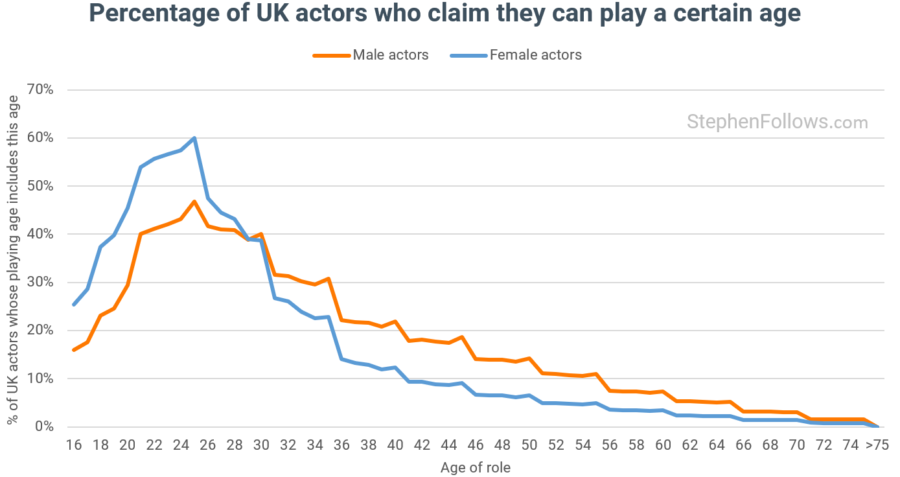
Professional age is a range, not a number
Part of the reason that such a high percentage of actors can claim to play a 25-year-old character is that an actor’s playing age is a range, not a single figure. It states the youngest and the oldest age the actor feels they can represent.
A third of all actors claim a playing range of ten years, such as 25 to 34, inclusive.
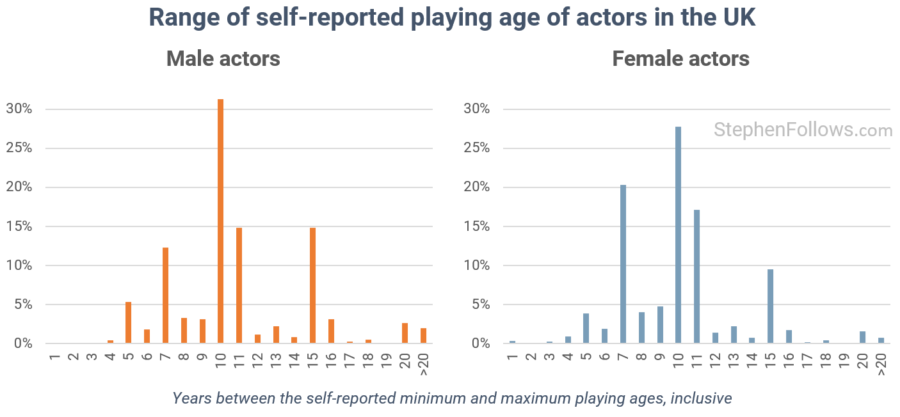
Under or overage?
Finally, I wanted to take a quick look at the relationship between actual age and playing age for the 15% of actors who stated both.
Actors in their early-20s tend to be aged around the middle of their playing range (i.e. someone who says she can play “16 to 24” is likely to actually be 20 years 0ld). Actors older than around 25 tend to be closer to the top end of their range, a pattern which continues as actors age.
A female actor who is really 40 years old will report an average playing range of between 30 and 41. This is likely to be a reflection of the industry’s veneration of youth, and actors being concerned that if they better align their playing range with their true age, they will lose work. (Of course, it could also be that by pure virtue of being an actor, you look five years younger than similarly-aged people in other professions, although this seems less likely).
On the chart below, the orange line is their real age and the light block bars indicate the average playing age. For example, for eighteen-year-olds, the average minimum was 16 and the average maximum was 22 years old.
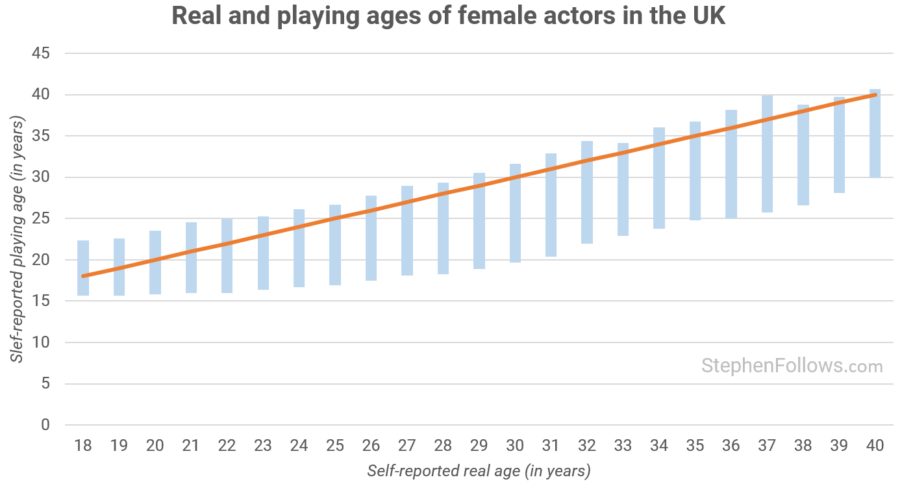
The chart above is for female actors and for brevity I have not included the male actors’ chart. The pattern is the same, although slightly closer to the middle of the playing range, which is unsurprising as the industry applies more pressure to be young on women than on men.
Bonus question – What gets shorter with age?
This actors’ dataset is going to be fascinating to explore in future articles. For now, I wanted to end on one interesting titbit I found, when looking at how actors’ appearances change as they age.
I looked at hair length for both male and female actors. I can’t use their real age as it limits the data so as a proxy I used the mid-point between the youngest and oldest ages each actor says that they can play. As we saw above, this may be a slight under-representation of their true age but not wildly so.
For female actors in their 20s and 30s, the most popular length is long, but from the late 30s, mid-length hair is far more common.
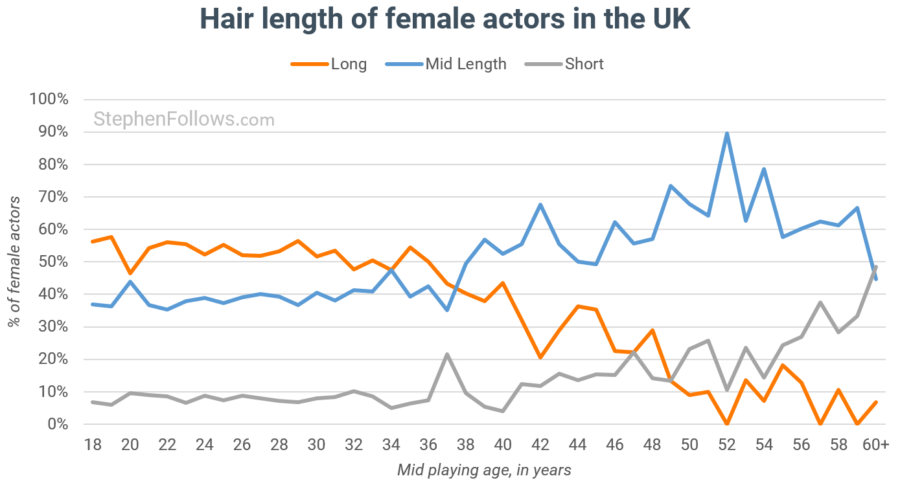
The male picture is a little messier, as I included ‘shaved’, ‘balding’ and bald’. Fewer than 0.1% of female actors fell into this category, so I did not show them on the chart. However, 3.5% of male actors are shaved, 4.3% are balding and 2.2% are bald.
Overall, around two-thirds of male actors keep their hair short, no matter their age.
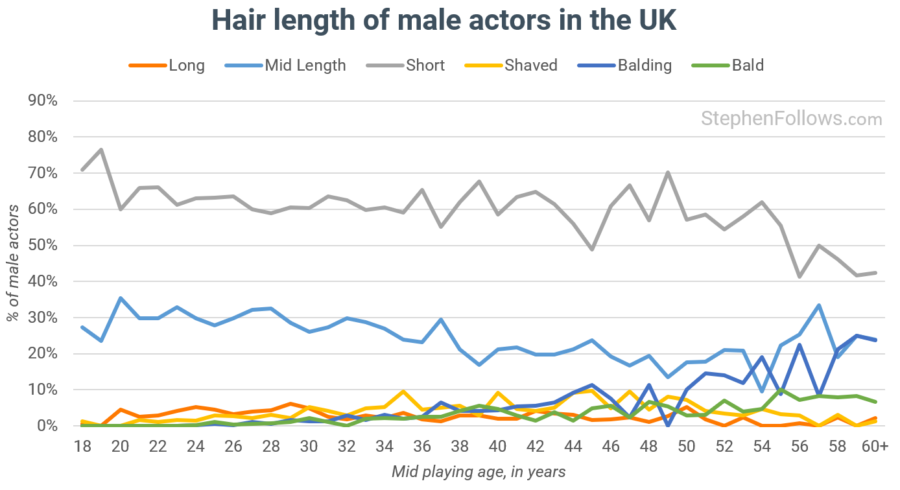
Notes
I built my database of actors from a number of public sources including Spotlight, Equity, Mandy / Casting Call Pro, Wikipedia and actors’ own websites. I was helped by a couple of key facts:
- The vast majority of actors need to have a public profile of some type. Most UK actors have a Spotlight page as Spotlight acts as the industry’s de facto indicator of an actor’s professional status and is a trusted source for actor CVs. The most famous actors don’t tend to keep their Spotlight page up to date and some take it down altogether. But this accounts for a small number of performers. At the other end of the spectrum are those actors who do not have the required experience, or who cannot pay the ~£150 annual fee, to keep an active Spotlight page. But if they are looking for work then it’s extremely likely they will have a profile on at least one of the other sites I used as sources.
- Each actor has a unique stage name. The UK actors’ union, Equity, requires that all performers have a unique stage name which they use across their professional career. Not only can a new performer not use the name of an existing, active actor but they cannot even use subtle variations (i.e. adding a middle name or initial, hyphenating, etc). The only exception is when an actor retires (and/or stops renewing their professional presence, such as on Spotlight) at which point their name is up for grabs again. This quirk of the acting business allowed me to mix data from a number of sources for the same performer, enriching the dataset and preventing double counting.
A few caveats are needed on the data, including:
- I built this dataset last year (2018) but it has taken me a while to get to the number crunching. As this is a study of actors aged 18 or older, there are a handful of 18-year-old actors right now who are not included. Plus it will include actors who have retired extremely recently.
- This is self-reported data which actors have chosen to reveal publicly in order to help them get hired. Therefore, there are a few layers of artifice which could mean that the numbers differ from reality. For example, I wouldn’t be shocked if some actors claim that they are slightly taller, younger or more talented than they actually are. It’s also possible that actors have not kept their profiles up to date as they learned new skills, changed their appearance or as they aged.
Each of the sources provided different data points. If the same actor appeared within multiple sources then I gained a detailed and rich picture of their professional profile. However, if they only appeared in one or two, then I may not have data for some of the topics I studied. Therefore, the percentages shown above are for actors whose data I had on the topic in question.
I removed rare outlying data points which were patently untrue and were skewing the data. A good example is the actor who claims a 940-year playing range. I suspect this is hyperbole than a true reflection of the age audiences will judge him to be.
I did not include ‘real vs playing age’ data for actors over 40 years old as so few reported their age as to make the data unreliable.
Epilogue
As well as giving us a fascinating snapshot into the actor-base in the UK, this data can also be used to spot inefficiencies and inequities in the sector. In the coming months, I hope to use the data to track how different types of actors are treated by the industry and how their experiences differ.
If you have a theory, question or even a dataset which you think could help to advance the study of my current actor’s database, please do get in touch.

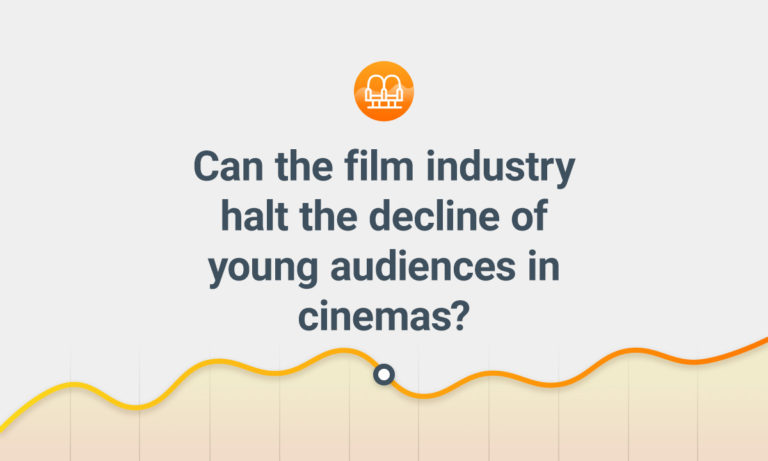
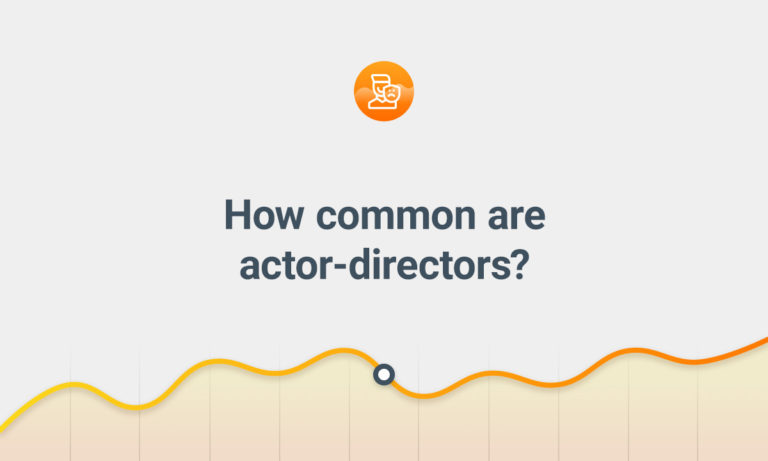
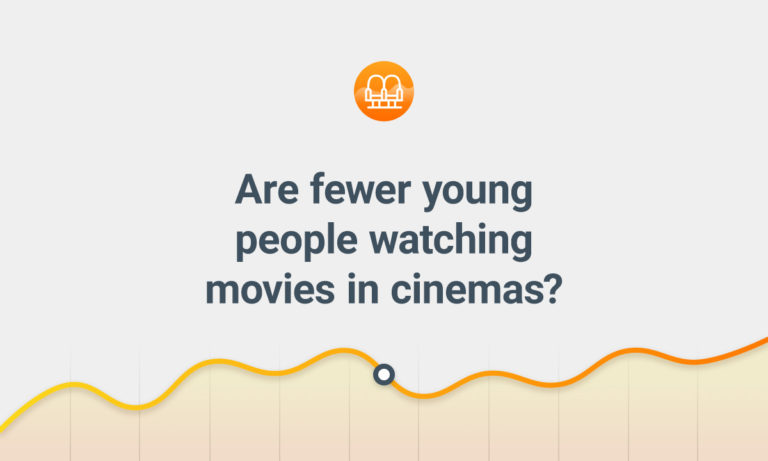

Comments
Hair length? What happened to wearing a wig?
Thank you Stephen, for yet another fascinating study. What interested me most was to see how the ‘self reported playing age’ shifts as actors get older. Actors in their late teens/early twenties put themselves more or less in the middle, reporting that they can play up to 5 years older and 5 years younger than their real age.
By the age of 23, this makes a significant shift to about seven years younger and three older.
Actors nearing 40, report a playing age of nine years younger and just one older. Does this mean actors in their late thirties lack the talent to play older roles? Are they less interested in such roles? Do they worry that by playing older characters they will never get younger roles again?
Is the industry pressure to be young so great that actors are too frightened to take on older characters? With so many films, TV series and stories featuring an ever expanding array of older characters, it would be a shame to think good actors are passing these up because of the pressure to be young.
I love this and I’m dying to see more, but I don’t feel that you answered the question you posed: Is acting dominated by the young? You answered the questions, “Are there more young actors” and “Do actors want to appear younger than they are.” That answer is yes, but there are likely to be more young in most professions because almost everyone enters a profession young, but individuals leave as they age for a variety of reasons and subsequently there will be fewer old than young: health, death, and “advancement” for instance. It is not unusual for actors to become producers or casting directors for instance, or models, or singers, but it is unusual for older individuals to move to acting, though it certainly happens.
To answer your question, I feel you need to compare this data against other benchmarks—for example, “success.” I would posit that a higher percentage of older actors are working “full time” than young actors. It may also be true that older actors command more money, as they are a rarer commodity, particularly true if one discounts the marquee star outliers. So while there may be fewer, older actors, these older actors may be more successful.
I’d also be very interested in how this compares to other professions, particularly those that might also be biased towards youth for more obvious reasons.
Another interesting question that your data may not be able to answer would be are older actors more successful at playing younger, than younger actors are at playing older.